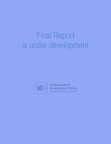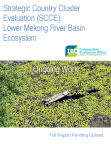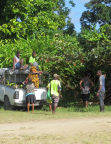With the selected criteria you have 1 - 10 of 209 results.
Eighth Comprehensive Evaluation of the GEF (OPS8) - Ongoing
Status: Ongoing | Last updated on:
Evaluation Grouping: Performance, Comprehensive Evaluation (OPS)
Learning from Challenges in GEF Projects
Status: Published | Last updated on:
Evaluation Grouping: Performance
Evaluation:
English
Strategic Country Cluster Evaluation (SCCE): Lower Mekong River Basin Ecosystem
Status: Published | Last updated on:
Evaluation Grouping: Thematic
Evaluation:
English
Evaluation of the Socioeconomic Co-Benefits of GEF-Funded Interventions
Status: Unedited | Last updated on:







